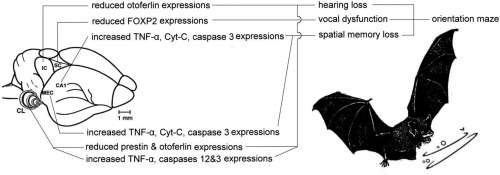Imidacloprid, an insecticide from the group neonicotinoids, is the world’s most widely used agent against insect pests due to its high effectiveness. However, as it has also led to a worldwide decline in honeybee populations, this remedy has been criticised. Not only the honeybee, but also many other insect species are threatened by the massive use of neonicotinoids. However, the question also arises as to what influence neonicotinoids have on the insect-eating animals. The presented study investigated the influence of imidacloprid on bats. It was found that the toxicity of imidacloprid can affect the functions of the vocal, hearing, orientation and spatial memory system of bats (Hipposideros armiger terasensis). These results provide clear evidence of imidacloprid-caused disturbances of the echolocalization system in insect-eating bats.
Literature of the study:Chung-Hsin Wu, Ching-Lung Lin, Sheue-Er Wang, Chen-Wen Lu (2020): Effects of imidacloprid, a neonicotinoid insecticide, on the echolocation system of insectivorous bats. Pesticide Biochemistry and Physiology 163 (2020) 94-101 https://www.sciencedirect.com/science/article/abs/pii/S0048357519304705

